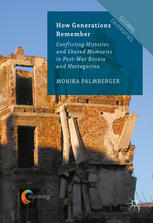

Most ebook files are in PDF format, so you can easily read them using various software such as Foxit Reader or directly on the Google Chrome browser.
Some ebook files are released by publishers in other formats such as .awz, .mobi, .epub, .fb2, etc. You may need to install specific software to read these formats on mobile/PC, such as Calibre.
Please read the tutorial at this link: https://ebookbell.com/faq
We offer FREE conversion to the popular formats you request; however, this may take some time. Therefore, right after payment, please email us, and we will try to provide the service as quickly as possible.
For some exceptional file formats or broken links (if any), please refrain from opening any disputes. Instead, email us first, and we will try to assist within a maximum of 6 hours.
EbookBell Team

0.0
0 reviewsThis book is open access under a CC BY 4.0 license.
This book provides a profound insight into post-war Mostar, and the memories of three generations of this Bosnian-Herzegovinian city. Drawing on several years of ethnographic fieldwork, it offers a vivid account of how personal and collective memories are utterly intertwined, and how memories across the generations are reimagined and ‘rewritten’ following great socio-political change. Focusing on both Bosniak-dominated East Mostar and Croat-dominated West Mostar, it demonstrates that, even in this ethno-nationally divided city with its two divergent national historiographies, generation-specific experiences are crucial in how people ascribe meaning to past events. It argues that the dramatic and often brutal transformations that Bosnia and Herzegovina has witnessed have led to alterations in memory politics, not to mention disparities in the life situations faced by the different generations in present-day post-war Mostar. This in turn has created variations in memories along generational lines, which affect how individuals narrate and position themselves in relation to the country's history. This detailed and engaging work will appeal to students and scholars of anthropology, sociology, political science, history and oral history, particularly those with an interest in memory, post-socialist Europe and conflict studies.